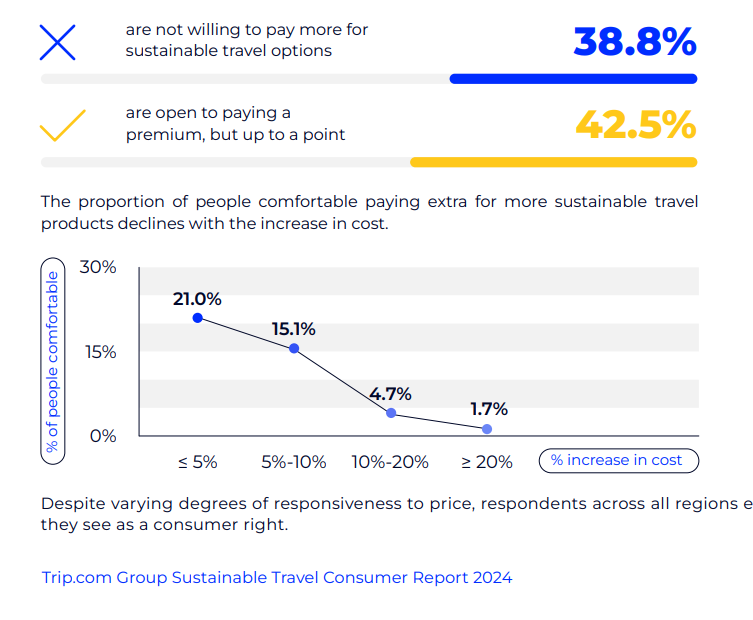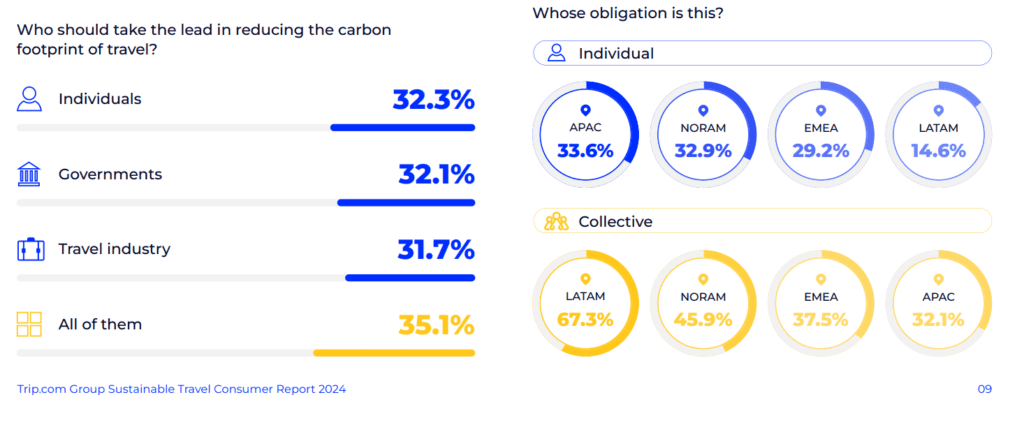Skift Take
You might be investing thousands in making travel more sustainable, but your audience is still scratching their heads. Time to get back to basics: simplify your message and educate them!
While there is a growing awareness about sustainability among travelers, there remains a gap between awareness and action, according to Trip.comâs Sustainable Travel Consumer Report.
How big is the gap? While 92% acknowledge the importance of sustainable travel, a little less than 57% said they practiced it.
According to the survey, a principal reason for people not prioritizing or choosing sustainable travel options is âa lack of clear understanding of the concept.â
What’s Confusing Travelers
While a majority said they are not entirely clear of the concept, 32% doubt the authenticity of sustainable products or initiatives, while 22% fail to see how sustainability can improve the travel experience.
An earlier Skift article had noted that the top reasons that discourage Asian consumers from making sustainable travel choices are lack of access and information and claims that are hard to verify.Â
âWe must use public education to dispel myths and misconceptions surrounding the term (sustainable travel). At the same time, we should make more sustainable options more available and visible is also pivotal,â the Trip.com report said.
And of course, the divide is more apparent when it comes to paying extra for sustainable travel options, especially when it comes at a time of economic challenge and soaring living costs.
âThe proportion of people comfortable paying extra for more sustainable travel products declines with the increase in cost,â the report stated.

The report draws survey samples from 109 countries and territories including Asia Pacific, Europe, the Middle East and Africa (EMEA), North America and Latin America.
More travelers in North America, EMEA, and Latin America are unwilling to pay extra for sustainable options.
Who should take the lead in reducing travelâs carbon footprint? While travelers in EMEA, Latin America and North America see it more as a shared commitment between governments, communities, and the travel industry, Asia Pacific travelers stress that sustainable travel is more of an individual responsibility than a shared duty.


Gen Z Is Just as Confused
Despite the exposure to sustainability-related information, Gen Z travelers are just as reluctant as other age groups to pay extra for sustainable options. While more than half say that the environment is a major motivator for traveling sustainably, more than 48% are unsure of what qualifies as a sustainable trip, while almost 32% fail to see any added benefit from sustainable travel.
The silver lining: 77% of millennials and 73% of Gen Zs consider using online travel agencies that provide more sustainable options.
And what do they want from these online travel companies: Travelers want travel companies to clearly label sustainable options, they also expect them to offer incentives/rewards to travelers and lastly, they want these companies to make it easier for them to filter and find sustainable options.
âTo align themselves with this goal, travel companies can guide this generation with clear labelling and incentives for sustainable choices. Online travel agencies stand to benefit by offering more sustainable products to conscious consumers,â the report stated.
Skiftâs in-depth reporting on climate issues is made possible through the financial support of Intrepid Travel. This backing allows Skift to bring you high-quality journalism on one of the most important topics facing our planet today. Intrepid is not involved in any decisions made by Skiftâs editorial team.

